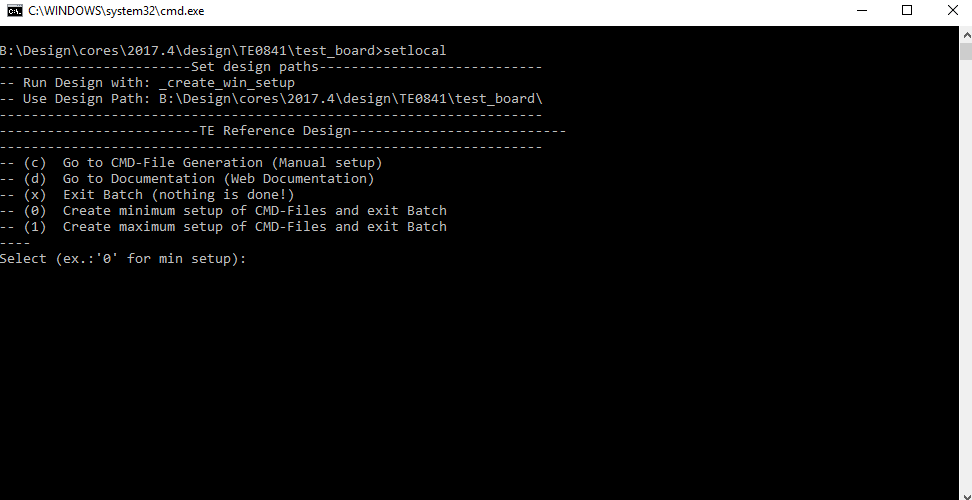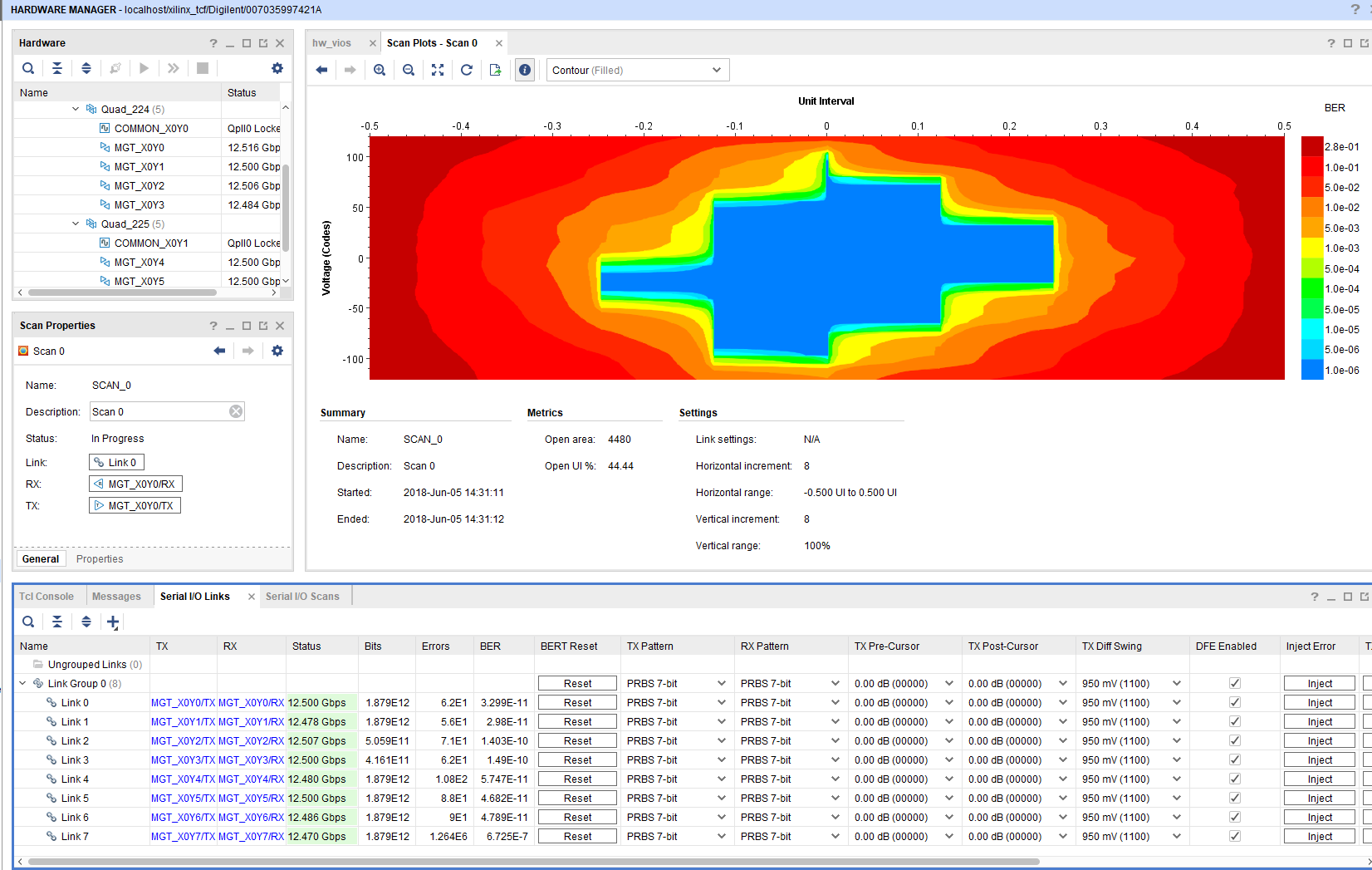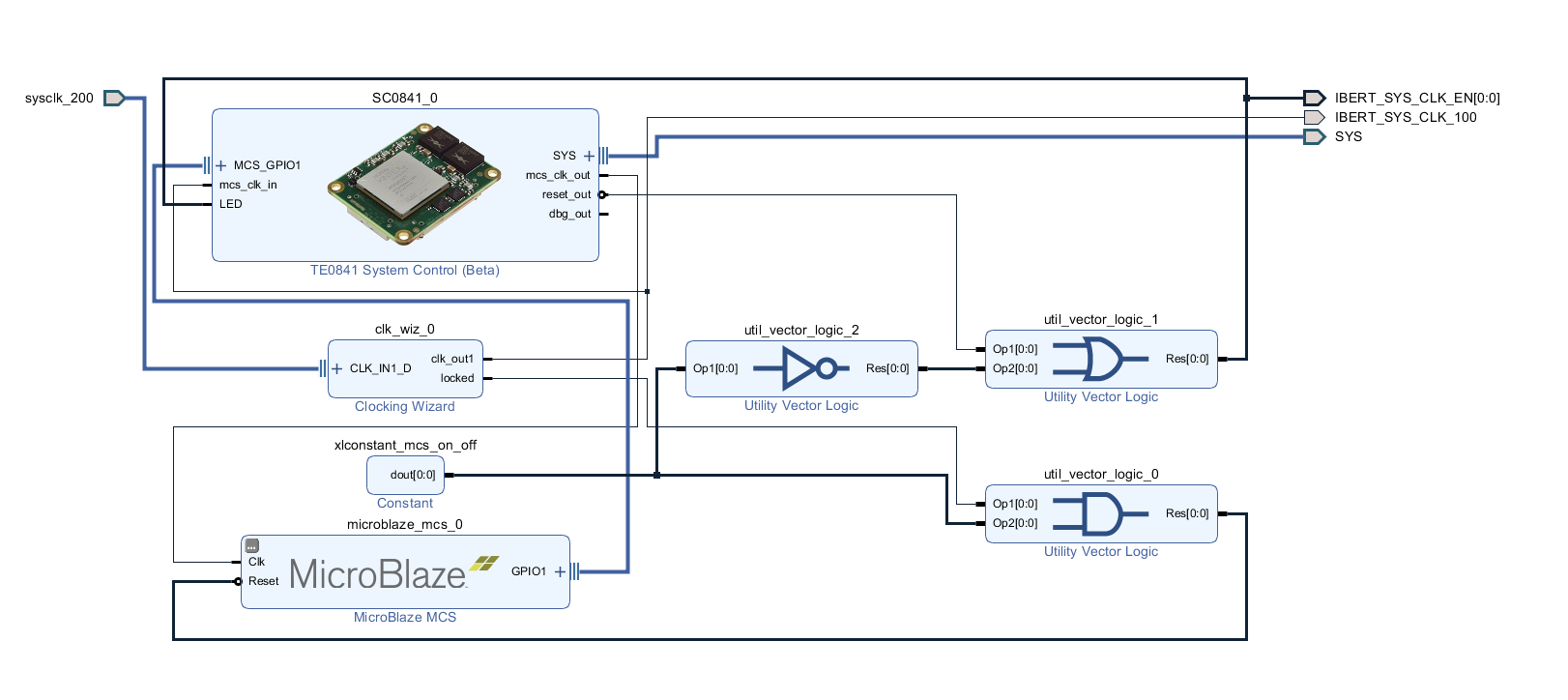Table of contents
Overview
Example show, how to reconfigure SI5338 with MCS and monitor CLK. Additional MicroBlaze is add for Hello TE0741 example.
Key Features
- MGT
- SI5338 initialisation with MCS
Revision History
| Date | Vivado | Project Built | Authors | Description |
|---|---|---|---|---|
| 2018-06-05 | 2017.4 | TE0841-IBERT_noprebuilt-vivado_2017.4-build_10_20180605143852.zip TE0841-IBERT-vivado_2017.4-build_10_20180605143837.zip | John Hartfiel |
|
Release Notes and Know Issues
| Issues | Description | Workaround | To be fixed version |
|---|---|---|---|
| --- | --- | --- | --- |
Requirements
Software
| Software | Version | Note |
|---|---|---|
| Vivado | 2017.4 | needed |
| SDK | 2017.4 | needed |
Hardware
Basic description of TE Board Part Files is available on TE Board Part Files.
Complete List is available on <design name>/board_files/*_board_files.csv
Design supports following modules:
| Module Model | Board Part Short Name | PCB Revision Support | DDR | QSPI Flash | Others | Notes |
|---|---|---|---|---|---|---|
| TE0841-01-035-1C | 01_35_1c | REV01 | 2x 512MB DDR4 | 32MB | --- | |
| TE0841-01-035-1I | 01_35_1i | REV01 | 2x 512MB DDR4 | 32MB | --- | |
| TE0841-01-035-2I | 01_35_2i | REV01 | 2x 512MB DDR4 | 32MB | --- | |
| TE0841-01-040-1C | 01_40_1c | REV01 | 2x 512MB DDR4 | 32MB | --- | |
| TE0841-01-040-1I | 01_40_1i | REV01 | 2x 512MB DDR4 | 32MB | --- | |
| TE0841-01-040-2I | 01_40_2i | REV01 | 2x 512MB DDR4 | 32MB | --- |
Design supports following carriers:
| Carrier Model | Notes |
|---|---|
| TEBA0841 | used as reference carrier |
Additional HW Requirements:
| Additional Hardware | Notes |
|---|---|
| USB Cable for JTAG/UART | Check Carrier Board and Programmer for correct type |
| XMOD Programmer | Carrier Board dependent, only if carrier has no own FTDI |
| Heat sink | It's recommended to use heat sink for this design |
Content
For general structure and of the reference design, see Project Delivery
Design Sources
| Type | Location | Notes |
|---|---|---|
| Vivado | <design name>/block_design <design name>/constraints <design name>/ip_lib <design name>/firmware | Vivado Project will be generated by TE Scripts |
| SDK/HSI | <design name>/sw_lib | Additional Software Template for SDK/HSI and apps_list.csv with settings for HSI |
Additional Sources
| Type | Location | Notes |
|---|---|---|
| SI5338 Project | \misc\SI5338 |
Prebuilt
File | File-Extension | Description |
|---|---|---|
| BIT-File | *.bit | FPGA (PL Part) Configuration File |
| DebugProbes-File | *.ltx | Definition File for Vivado/Vivado Labtools Debugging Interface |
| Diverse Reports | --- | Report files in different formats |
| Hardware-Platform-Specification-Files | *.hdf | Exported Vivado Hardware Specification for SDK/HSI and PetaLinux |
| LabTools Project-File | *.lpr | Vivado Labtools Project File |
MCS-File | *.mcs | Flash Configuration File with Boot-Image (MicroBlaze or FPGA part only) |
MMI-File | *.mmi | File with BRAM-Location to generate MCS or BIT-File with *.elf content (MicroBlaze only) |
| Software-Application-File | *.elf | Software Application for Zynq or MicroBlaze Processor Systems |
Download
Reference Design is only usable with the specified Vivado/SDK/PetaLinux/SDx version. Do never use different Versions of Xilinx Software for the same Project.
Reference Design is available on:
Design Flow
Reference Design is available with and without prebuilt files. It's recommended to use TE prebuilt files for first lunch.
Trenz Electronic provides a tcl based built environment based on Xilinx Design Flow.
See also:Vivado/SDK/SDSoC
The Trenz Electronic FPGA Reference Designs are TCL-script based project. Command files for execution will be generated with "_create_win_setup.cmd" on Windows OS and "_create_linux_setup.sh" on Linux OS.
TE Scripts are only needed to generate the vivado project, all other additional steps are optional and can also executed by Xilinx Vivado/SDK GUI. For currently Scripts limitations on Win and Linux OS see: Project Delivery Currently limitations of functionality
- _create_win_setup.cmd/_create_linux_setup.sh and follow instructions on shell:
- Press 0 and enter for minimum setup
- (optional Win OS) Generate Virtual Drive or use short directory for the reference design (for example x:\<design name>)
- Create Project
- Select correct device and Xilinx install path on "design_basic_settings.cmd" and create Vivado project with "vivado_create_project_guimode.cmd"
Note: Select correct one, see TE Board Part Files
- Select correct device and Xilinx install path on "design_basic_settings.cmd" and create Vivado project with "vivado_create_project_guimode.cmd"
- Create HDF and export to prebuilt folder
- Run on Vivado TCL: TE::hw_build_design -export_prebuilt
Note: Script generate design and export files into \prebuilt\hardware\<short dir>. Use GUI is the same, except file export to prebuilt folder
- Run on Vivado TCL: TE::hw_build_design -export_prebuilt
- Generate MCS Firmware (optional):
- Create SDK Project with TE Scripts on Vivado TCL: TE::sw_run_sdk
- Create "SCU" application
Note: Select MCS Microblaze and SCU Application - Select Release Built
- Regenerate App
- (optional) Copy "\\workspace\sdk\scu\Release\scu.elf" into "\firmware\microblaze_mcs_0\"
- Regenerate Vivado Project or Update Bitfile only and "scu.elf"
- Copy MCS file with Bitfile into prebuilt folder
- Create SDK Project with TE Scripts on Vivado TCL: TE::sw_run_hsi
Launch
Programming
Check Module and Carrier TRMs for proper HW configuration before you try any design.
Xilinx documentation for programming and debugging: Vivado/SDK/SDSoC-Xilinx Software Programming and Debugging
QSPI
- Connect JTAG and power on PCB
- (if not done) Select correct device and Xilinx install path on "design_basic_settings.cmd" and create Vivado project with "vivado_create_project_guimode.cmd" or open with "vivado_open_project_guimode.cmd", if generated.
- Type on Vivado Console: TE::pr_program_flash_mcsfile -swapp
Note: Alternative use SDK or setup Flash on Vivado manually - Reboot (if not done automatically)
SD
Not used on this Example.
JTAG
- Connect JTAG and power on PCB
- Open Vivado HW Manager
- Program FPGA with Bitfile from "prebuilt\hardware\<short dir>"
Usage
- Prepare HW like described on section Programming
- Connect UART USB (most cases same as JTAG)
- Power on PCB
Note: FPGA Loads Bitfile from Flash,MCS Firmware configure SI5338 and starts IBERT.
Do not reboot, if Bitfile programming over JTAG is used as programming method.- On TE0841 SI5338 has default configuration and reprogramming of SI5338 is optional
- LED:
- D1 (green) OFF→ MCS SI configuration finished (System Reset is off)
Vivado HW Manager:
- Open Vivado HW-Manager
- "Refresh device" is needed after Bitfile programming, because MCS reconfigure SI5338 and enables IBERT a little bit later.
- loopback depends on TEB0841 Revision an connection
| IBERT | Component Name | Net Name | TEB0841 |
|---|---|---|---|
| X0Y0 | 224-0 | MGT4 | loop back RX/TX |
| X0Y1 | 224-1 | MGT5 | loop back RX/TX |
| X0Y2 | 224-2 | MGT6 | loopback over SD Pin header possible with lower Linerate otherwise use internal loopback |
| X0Y3 | 224-3 | MGT7 | loop back RX/TX. Note: N.C. on TEB0841-01, use internal loopback |
| X0Y4 | 225-0 | MGT0 | loop back RX/TX |
| X0Y5 | 225-1 | MGT1 | loop back RX/TX |
| X0Y6 | 225-2 | MGT2 | loop back RX/TX |
| X0Y7 | 225-3 | MGT3 | loopback over sfp possible |
System Design - Vivado
Block Design
HDL
- IBERT_top.v
- ibert xci IPs
Constrains
Basic module constrains
set_property BITSTREAM.GENERAL.COMPRESS TRUE [current_design] set_property BITSTREAM.CONFIG.CONFIGRATE 69 [current_design] set_property CFGBVS GND [current_design] set_property CONFIG_VOLTAGE 1.8 [current_design] set_property CONFIG_MODE SPIx4 [current_design] set_property BITSTREAM.CONFIG.SPI_32BIT_ADDR YES [current_design] set_property BITSTREAM.CONFIG.SPI_BUSWIDTH 4 [current_design] set_property BITSTREAM.CONFIG.M1PIN PULLNONE [current_design] set_property BITSTREAM.CONFIG.M2PIN PULLNONE [current_design] set_property BITSTREAM.CONFIG.M0PIN PULLNONE [current_design] set_property BITSTREAM.CONFIG.USR_ACCESS TIMESTAMP [current_design]
Design specific constrain
# file: ibert_ultrascale_gth_0.xdc #################################################################################### ## ____ ____ ## / /\/ / ## /___/ \ / Vendor: Xilinx ## \ \ \/ Version : 2012.3 ## \ \ Application : IBERT Ultrascale ## / / Filename : example_ibert_ultrascale_gth_0.xdc ## /___/ /\ ## \ \ / \ ## \___\/\___\ ## ## ## ## Generated by Xilinx IBERT 7Series ##************************************************************************** ## ## Icon Constraints ## create_clock -name D_CLK -period 10.0 [get_ports gth_sysclkp_i] set_clock_groups -group [get_clocks D_CLK -include_generated_clocks] -asynchronous set_property C_CLK_INPUT_FREQ_HZ 100000000 [get_debug_cores dbg_hub] set_property C_ENABLE_CLK_DIVIDER true [get_debug_cores dbg_hub] ##gth_refclk lock constraints ## set_property PACKAGE_PIN AD6 [get_ports gth_refclk0p_i[0]] set_property PACKAGE_PIN AD5 [get_ports gth_refclk0n_i[0]] set_property PACKAGE_PIN AB6 [get_ports gth_refclk1p_i[0]] set_property PACKAGE_PIN AB5 [get_ports gth_refclk1n_i[0]] ## ## Refclk constraints ## create_clock -name gth_refclk0_0 -period 8.0 [get_ports gth_refclk0p_i[0]] create_clock -name gth_refclk1_0 -period 8.0 [get_ports gth_refclk1p_i[0]] set_clock_groups -group [get_clocks gth_refclk0_0 -include_generated_clocks] -asynchronous set_clock_groups -group [get_clocks gth_refclk1_0 -include_generated_clocks] -asynchronous ## ## System clock pin locs and timing constraints ## set_property PACKAGE_PIN R25 [get_ports gth_sysclkp_i] set_property IOSTANDARD LVDS [get_ports gth_sysclkp_i]
Software Design - SDK/HSI
For SDK project creation, follow instructions from:
Application
SCU
MCS Firmware to configure SI5338 and Reset System.
Template location: \sw_lib\sw_apps\scu
Additional Software
SI5338
Download ClockBuilder Desktop for SI5338
- Install and start ClockBuilder
- Select SI5338
- Options → Open register map file
Note: File location <design name>/misc/Si5338/RegisterMap.txt - Modify settings
- Options → save C code header files
- Replace Header files from SCU template with generated file
Appx. A: Change History and Legal Notices
Document Change History
To get content of older revision got to "Change History" of this page and select older document revision number.
| Date | Document Revision | Authors | Description |
|---|---|---|---|
| |||
| 2018-04-16 | v.1 |
| |
| All |
Legal Notices
Data Privacy
Please also note our data protection declaration at https://www.trenz-electronic.de/en/Data-protection-Privacy
Document Warranty
The material contained in this document is provided “as is” and is subject to being changed at any time without notice. Trenz Electronic does not warrant the accuracy and completeness of the materials in this document. Further, to the maximum extent permitted by applicable law, Trenz Electronic disclaims all warranties, either express or implied, with regard to this document and any information contained herein, including but not limited to the implied warranties of merchantability, fitness for a particular purpose or non infringement of intellectual property. Trenz Electronic shall not be liable for errors or for incidental or consequential damages in connection with the furnishing, use, or performance of this document or of any information contained herein.
Limitation of Liability
In no event will Trenz Electronic, its suppliers, or other third parties mentioned in this document be liable for any damages whatsoever (including, without limitation, those resulting from lost profits, lost data or business interruption) arising out of the use, inability to use, or the results of use of this document, any documents linked to this document, or the materials or information contained at any or all such documents. If your use of the materials or information from this document results in the need for servicing, repair or correction of equipment or data, you assume all costs thereof.
Copyright Notice
No part of this manual may be reproduced in any form or by any means (including electronic storage and retrieval or translation into a foreign language) without prior agreement and written consent from Trenz Electronic.
Technology Licenses
The hardware / firmware / software described in this document are furnished under a license and may be used /modified / copied only in accordance with the terms of such license.
Environmental Protection
To confront directly with the responsibility toward the environment, the global community and eventually also oneself. Such a resolution should be integral part not only of everybody's life. Also enterprises shall be conscious of their social responsibility and contribute to the preservation of our common living space. That is why Trenz Electronic invests in the protection of our Environment.
REACH, RoHS and WEEE
REACH
Trenz Electronic is a manufacturer and a distributor of electronic products. It is therefore a so called downstream user in the sense of REACH. The products we supply to you are solely non-chemical products (goods). Moreover and under normal and reasonably foreseeable circumstances of application, the goods supplied to you shall not release any substance. For that, Trenz Electronic is obliged to neither register nor to provide safety data sheet. According to present knowledge and to best of our knowledge, no SVHC (Substances of Very High Concern) on the Candidate List are contained in our products. Furthermore, we will immediately and unsolicited inform our customers in compliance with REACH - Article 33 if any substance present in our goods (above a concentration of 0,1 % weight by weight) will be classified as SVHC by the European Chemicals Agency (ECHA).
RoHS
Trenz Electronic GmbH herewith declares that all its products are developed, manufactured and distributed RoHS compliant.
WEEE
Information for users within the European Union in accordance with Directive 2002/96/EC of the European Parliament and of the Council of 27 January 2003 on waste electrical and electronic equipment (WEEE).
Users of electrical and electronic equipment in private households are required not to dispose of waste electrical and electronic equipment as unsorted municipal waste and to collect such waste electrical and electronic equipment separately. By the 13 August 2005, Member States shall have ensured that systems are set up allowing final holders and distributors to return waste electrical and electronic equipment at least free of charge. Member States shall ensure the availability and accessibility of the necessary collection facilities. Separate collection is the precondition to ensure specific treatment and recycling of waste electrical and electronic equipment and is necessary to achieve the chosen level of protection of human health and the environment in the European Union. Consumers have to actively contribute to the success of such collection and the return of waste electrical and electronic equipment. Presence of hazardous substances in electrical and electronic equipment results in potential effects on the environment and human health. The symbol consisting of the crossed-out wheeled bin indicates separate collection for waste electrical and electronic equipment.
Trenz Electronic is registered under WEEE-Reg.-Nr. DE97922676.


